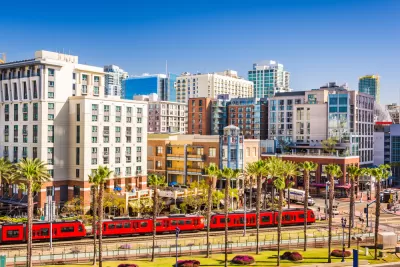After approving parking reforms for swaths of residential areas in the city in 2019, the city of San Diego is expanding the effort to select commercial areas in the city.

"San Diego took the bold and controversial step Tuesday of wiping out parking requirements for businesses in many neighborhoods to accelerate efforts to make the city less car-reliant and more climate-friendly," reports David Garrick for The San Diego Union-Tribune.
The new parking requirements will affect businesses located near public transit or in small plazas near residential areas, according to Garrick.
This is not the first wave of parking reforms for the city of San Diego. After raising the possibility in 2018, the city began the process of unbundling parking in 2019, eventually approving an ordinance that eliminated parking requirements for new condominium and apartment complexes in neighborhoods near mass transit in March of that year. The city started to examine the possibility of removing parking requirements for some commercial developments in June of this year.
The parking requirements approved this week apply both to new and existing business. According to Garrick: "New businesses in those areas would no longer have to provide any parking spaces for customers or staff. And existing businesses could immediately transform their parking spots into outdoor dining or extra retail space."
The source article includes soundbites to encapsulate the political debate that preceded this week's City Council's vote.
FULL STORY: San Diego adopts new policy wiping out parking requirements for many businesses

Alabama: Trump Terminates Settlements for Black Communities Harmed By Raw Sewage
Trump deemed the landmark civil rights agreement “illegal DEI and environmental justice policy.”

Planetizen Federal Action Tracker
A weekly monitor of how Trump’s orders and actions are impacting planners and planning in America.

The 120 Year Old Tiny Home Villages That Sheltered San Francisco’s Earthquake Refugees
More than a century ago, San Francisco mobilized to house thousands of residents displaced by the 1906 earthquake. Could their strategy offer a model for the present?

Opinion: California’s SB 79 Would Improve Housing Affordability and Transit Access
A proposed bill would legalize transit-oriented development statewide.

Record Temperatures Prompt Push for Environmental Justice Bills
Nevada legislators are proposing laws that would mandate heat mitigation measures to protect residents from the impacts of extreme heat.

Downtown Pittsburgh Set to Gain 1,300 New Housing Units
Pittsburgh’s office buildings, many of which date back to the early 20th century, are prime candidates for conversion to housing.
Urban Design for Planners 1: Software Tools
This six-course series explores essential urban design concepts using open source software and equips planners with the tools they need to participate fully in the urban design process.
Planning for Universal Design
Learn the tools for implementing Universal Design in planning regulations.
Clanton & Associates, Inc.
Jessamine County Fiscal Court
Institute for Housing and Urban Development Studies (IHS)
City of Grandview
Harvard GSD Executive Education
Toledo-Lucas County Plan Commissions
Salt Lake City
NYU Wagner Graduate School of Public Service





























